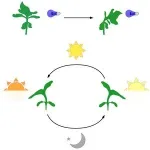(Press-News.org) URBANA, Ill. — A team of animal scientists from the University of Illinois Urbana-Champaign is set to deliver a potential game changer for subsistence farmers in Tanzania: cows that produce up to 20 times the milk of indigenous breeds.
The effort, published in Animal Frontiers, marries the milk-producing prowess of Holsteins and Jerseys with the heat, drought, and disease-resistance of Gyrs, an indigenous cattle breed common in tropical countries. Five generations of crosses result in cattle capable of producing 10 liters of milk per day under typical Tanzanian management, blasting past the half-liter average yield of indigenous cattle.
After breeding the first of these calves in the U.S., project leader Matt Wheeler, professor in the Department of Animal Sciences in the College of Agricultural, Consumer and Environmental Sciences (ACES) at Illinois, is ready to bring embryos to Tanzania.
“High-yielding Girolandos — Holstein-Gyr crosses — are common in Brazil, but because of endemic diseases there, those cattle can’t be exported to most other countries,” Wheeler said. “We wanted to develop a high health-status herd in the U.S. so we could export their genetics anywhere in the world.”
Wheeler’s team plans to implant 100 half-blood Holstein-Gyr or Jersey-Gyr embryos into indigenous cattle in two Tanzanian locations this March. The resulting calves will be inseminated through successive generations to create “pure synthetic” cattle with five-eighths Holstein or Jersey and three-eighths Gyr genetics. Unlike Girolandos, Jersey-Gyr pure synthetics do not yet have an official name.
Pure synthetics are worth the time and effort; once the five-eighths/three-eighths genetics are established, they’re locked in. In other words, calves from successive matings will maintain the same genetic ratio.
“The whole idea is to keep the disease and pest resistance linked together with the milk production so that as you breed, those traits don’t separate,” Wheeler said. “That's going to be the challenge in developing countries; until you get to the pure synthetic generation, there will always be the temptation to breed to the bull down the road, losing the effect.”
Wheeler’s team, including coauthor Moses Ole-Neselle of the Food and Agriculture Organization of the United Nations (FAO), cares about getting this effort right. Although developing the embryos took years of meticulous work, they’re not stopping there. The team hosted its first online course on bovine assisted reproduction technology last summer, including 12 participants from Tanzania. And there’s more to come.
“It was important to start training the first group of veterinarians and graduate students to adopt the technology, so when we get there, it's not a foreign thing,” Wheeler said. “The Tanzanian government wants this training and student exchanges. We’re going to continue investing in this program for as long as it takes.”
Wheeler recognizes the best genetics and most comprehensive training won’t amount to much if the plan doesn’t account for the local culture. With advice from collaborators like the Tanzania Livestock Research Institute and Teresa Barnes, director of the Center for African Studies at Illinois, Wheeler has already adjusted his strategy to accommodate the preferences of local Maasai herdsmen.
“We’ve learned some Maasai clans strongly prefer smaller, red cattle, so the Holstein crosses we made initially, which were large and black, weren’t going to work,” he said. “I had to start over with Jerseys, which set us back a bit. It will be worth it if they’re better accepted.”
But some aspects of Tanzanian cattle management will have to change to realize the full potential of the improved genetics. For example, Wheeler said nomadic Maasai herders often graze cattle 25 miles from their enclosures each day, limiting the energy available for milk production.
While the project is still in its early stages, it represents a step toward more climate-resilient animal agriculture, the topic of the special issue of Animal Frontiers in which Wheeler’s article is published. While Wheeler’s current priority is to bolster food security in the Global South where climate change is hitting hardest, he said the same technology could be used to protect cattle from changing climates here in the U.S. and around the world. In other words, tropical genetics could be inserted into our already high-yielding cattle to better withstand heat, drought, and disease.
“These cattle would work very well in Mexico, Texas, New Mexico, and California. Maybe it's time to start thinking about that now,” Wheeler said. “People don't usually think that far ahead, but my prediction is that people are going to look back and realize having tropical genetics earlier would have been a good thing.”
END
Climate-smart cows could deliver 10-20x more milk in Global South
2023-10-31
ELSE PRESS RELEASES FROM THIS DATE:
SARS-CoV-2 infection affects energy stores in the body, study shows
2023-10-31
CHAPEL HILL, N.C. – The lungs were once at the forefront of SARS-Cov-2 research, but as reports of organ failure and other serious complications poured in, scientists set out to discover how and why the respiratory virus was causing serious damage to the body's major organs, including the lungs.
An interdisciplinary COVID-19 International Research Team (COV-IRT), which includes UNC School of Medicine’s Jonathan C. Schisler, PhD, found that SARS-CoV-2 alters mitochondria on a genetic ...
Study examines financial sustainability of affordable housing-with-services models for older adults
2023-10-31
A groundbreaking study published in the journal Research in Aging sheds light on the financial challenges of housing-with-health-services models for low-income older adults. The report explores strategies for ensuring the sustainability of these beneficial efforts.
The study was conducted in partnership with Hebrew SeniorLife, a Harvard Medical School-affiliated nonprofit organization serving older adults in the Greater Boston area. It drew on insights from 31 key informational interviews and three focus groups ...
Earlier detection of cardiometabolic risk factors for kids may be possible through next generation biomarkers
2023-10-31
The next generation of cardiometabolic biomarkers should pave the way for earlier detection of risk factors for conditions such as obesity, diabetes and heart disease in children, according to a new scientific statement from the American Heart Association published in the journal Circulation.
“The rising number of children with major risk factors for cardiometabolic conditions represents a potential tsunami of preventable disease for our healthcare system,” says the statement’s lead author Michele Mietus-Snyder, M.D., ...
Wearable heart monitor ticks all the boxes for better healthcare: Study
2023-10-31
A new compact, lightweight, gel-free and waterproof electrocardiogram (ECG) sensor offers more comfort and less skin irritation, compared to similar heart monitoring devices on the market.
ECGs help manage cardiovascular disease – which affects around 4 million Australians and kills more than 100 people every day – by alerting users to seek medical care.
The team led by RMIT University in Australia has made the wearable ECG device that could be used to prevent heart attacks for people with cardiovascular disease, including in remote healthcare and ...
Binghamton researchers get FDA approval for drug to treat world’s most common genetic disease
2023-10-31
BINGHAMTON, N.Y. -- A new drug developed by professors from the School of Pharmacy and Pharmaceutical Sciences at Binghamton University has received Food and Drug Administration (FDA) approval for the treatment of patients with Duchenne muscular dystrophy (DMD), a common genetic disease that mostly affects young boys.
DMD is the most common genetic disease. It leads to the loss of the dystrophin protein in muscle tissues, with progressive weakness and challenges with day-to-day activities. The DMD gene is the largest gene in the human genome, ...
Trastuzumab deruxtecan: advantages also in HER2-low breast cancer
2023-10-31
The antibody-drug conjugate trastuzumab deruxtecan is approved for various therapeutic indications. Since March 2023, it can also be used as monotherapy for the treatment of adults with unresectable or metastatic HER2-low breast cancer who have received prior chemotherapy at this disease stage or developed disease recurrence early after adjuvant chemotherapy. Treatment with trastuzumab deruxtecan is the first approved therapy for patients with HER2-low breast cancer. The German Institute for Quality and Efficiency in Health Care (IQWiG) examined in an early benefit assessment whether the antibody-drug ...
Children with ADHD frequently use healthcare service before diagnosis, study finds
2023-10-31
Children and young people with attention deficit hyperactivity disorder (ADHD) use healthcare services twice as often in the two years before their diagnosis, a study by researchers at the University of Nottingham and King’s College London has found.
The research, published today in the journal Archives of Disease in Childhood shows that children with the neurodevelopmental disorder are twice as likely to see their GP, go to hospital for an admission, and even have operations, compared to children without ADHD.
The researchers say the results support the need for healthcare professionals to consider a potential diagnosis of ADHD in children who ...
The first oncogene was found more than 40 years ago. CNIO researchers have just discovered that it has a previously unknown mechanism of action
2023-10-31
In the late 1970s, the relationship between the c-Src gene and cancer was discovered. The first oncogene was identified.
Since then, c-Src has been found to be overactivated in half of colon, liver, lung, breast, prostate and pancreatic tumors, but its function is not yet fully understood.
CNIO researchers have now discovered that this oncogene is capable of 'self-activation', by means of a previously undescribed molecular mechanism. This finding has implications for the development of new drugs.
In ...
First classification of four stages of heart attack based on heart muscle damage is released
2023-10-31
Philadelphia, October 31, 2023 – Heart attacks, or acute myocardial infarction (MI), are one of the leading causes of death worldwide. The newly released Canadian Cardiovascular Society Classification of Acute Myocardial Infarction (CCS-AMI) appearing in the Canadian Journal of Cardiology, published by Elsevier, presents a four-stage classification of heart attack based on heart muscle damage. This work by a group of noted experts has the potential to stratify risk more accurately in heart attack patients and lays the groundwork for development of new, injury-stage-specific and tissue ...
New techniques efficiently accelerate sparse tensors for massive AI models
2023-10-31
Researchers from MIT and NVIDIA have developed two techniques that accelerate the processing of sparse tensors, a type of data structure that’s used for high-performance computing tasks. The complementary techniques could result in significant improvements to the performance and energy-efficiency of systems like the massive machine-learning models that drive generative artificial intelligence.
Tensors are data structures used by machine-learning models. Both of the new methods seek to efficiently exploit what’s ...





